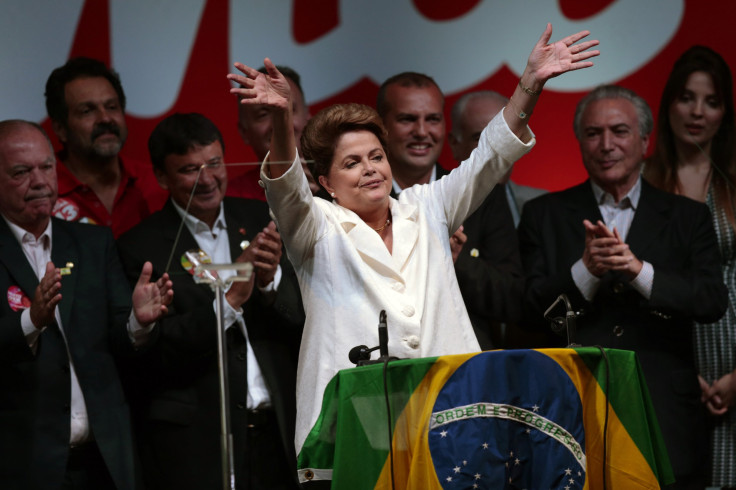Brazil Election Results: Markets Expected To Plunge After Dilma Rousseff Re-Election

Brazil's financial markets are expected to plunge Monday after President Dilma Rousseff narrowly won a second term Sunday against pro-business rival Aécio Neves. Rousseff's economic policies have been loudly criticized by Brazilian business leaders since the country entered a technical recession earlier this year.
The London-listed Brazil MSCI i-shares ETF hit seven-month lows on Monday, while the Tokyo-listed Ibovespa exchange traded fund fell almost 7 percent, according to Reuters. Under Rousseff, the real weakened 4.72 percent against the dollar this year and inflation is high. She won 51.6 percent of votes in Sunday's runoff election against Neves, who won 48.4 percent support in Brazil's tightest, most divisive election in more than three decades. Brazil's business leaders backed Neves, but Rousseff's social justice policies that have lifted millions of Brazilians out of poverty helped her stay in office. Ideli Salvatti, one of Rousseff's top ministers, said the government would seek to lead "a national reconciliation process given how tight the result was."
During his campaign, Neves called for tax reforms and less government bureaucracy. But Rousseff, 66, has said such policies would lead to high unemployment and stagnant wages. "Growth in Ms. Rousseff's first term in office was already the weakest under any president since the early 1990s and, in the absence of a major shift in policy in her second term, we expect more of the same over the next four years. Stocks, bonds and the currency are likely to fall when financial markets open later today," Neil Shearing, chief emerging markets economist at Capital Economics, said in a report.
Some financial analysts, however, said it's unfair to blame Rousseff for Brazil's economic woes. Bill Adams, senior international economist at PNC Financial Services, told CNBC on Monday: "Brazil is coming out of a recession that was due to high inflation, low commodity prices and general industrial uncompetitiveness. I don't think there's very much a government could have done to affect that."
© Copyright IBTimes 2024. All rights reserved.





















